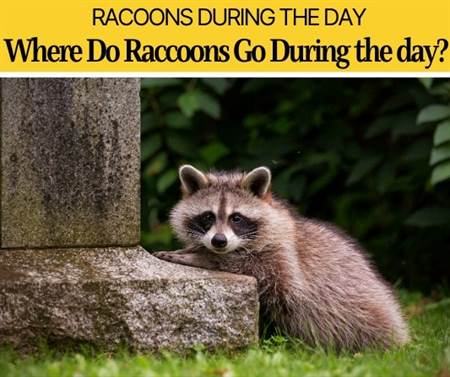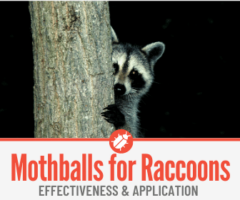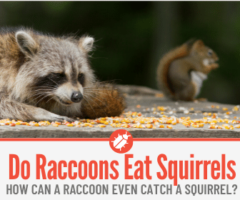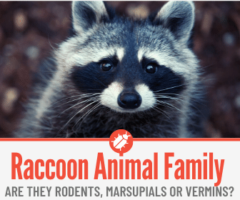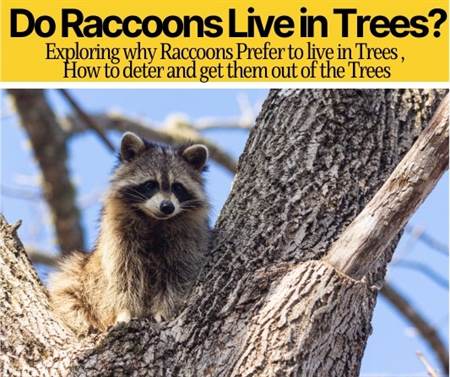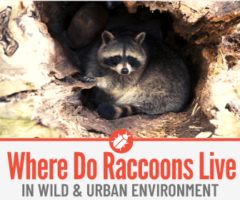 Raccoons are not Picky eaters and will eat just about anything they can find in their environment. In wild raccoons prefer to live & hunt for food near water.
Raccoons are not Picky eaters and will eat just about anything they can find in their environment. In wild raccoons prefer to live & hunt for food near water.
In this article we will see:
-Diet of a Raccoon in Wild and City,
-What Kind of Fruits/ Vegetables/ Food Raccoons like to eat,
-How to protect your garden from Raccoons,
-What kind of animals Raccoons can eat.
Also we will see if Raccoons can actually eat larger animals such as Cats ,Chickens or Rabbits.
What Do Raccoons Eat?
Raccoons are omnivores, meaning they eat both plant-based food as well as other animals. Some of Raccoon’s favourite foods they eat include berries, seeds, nuts, and arthropods, like crustaceans. Raccoons also enjoy eating aquatic animals such as crayfish, but will also eat small mammals like rats, mice and rabbits as well as reptiles such as snakes and also birds & their eggs.
In the city, Raccoons will eat leftover food, garbage, roadkill, and pet food. They love eating eggs from all kinds of animals including crocodiles, and are possibly the largest natural predator of turtle eggs in North America.
Clearly, raccoons are not at all picky eaters. In fact, some have surmised that one of the reasons for the survival of raccoons is that they are willing to satisfy their hunger with just about anything.
What Do Raccoons Eat in the Wild?
In the wild, raccoons eat a large variety of food, including mast (seeds, berries, and nuts) as well as plants such as mistletoe and cordgrass, laurel cherries, greenbrier, and berries of yaupon. When raccoons live near the ocean, they may eat a large amount of seafood such as crustaceans, mussels, fish, clams, and oysters.
They also enjoy different kinds of eggs, snails and minnows, and other kinds of meat, including reptiles and birds. Besides these, they will supplement their diet with small mammals especially during the winter when there is less of their favorite kinds of food.

How Do Raccoons Get Food?
Raccoons’ forepaws are especially helpful to them in getting food. Similar to humans, raccoons have many more sensory receptors in their front paws compared to their back paws. This sensitivity and skill with their forepaws often aids them in scavenging and they can make short work of a tightly closed trash can.
Also, unlike your cat or dog, a raccoon may use its front paws to pick up food and transfer it to its mouth. Besides scavenging for food, raccoons will occasionally hunt. With their sharp teeth and claws, they can be formidable predators to smaller animals.
Also read: Do Raccoons Come out During the day
What Do Raccoons Eat in the City?
Being the adaptable creatures they are, raccoons have comfortably settled into urban life. In the city, they will raid garbage cans and eat roadkill, as well as pet food if it’s left out.
What Human Food Do Raccoons Eat
Raccoons will eat pretty much anything they can find in the garbage from fruits and vegetables to pizza and cheeseburgers. One of the few food items raccoons do turn up their noses at is spicy food. Apparently, like me, they have fairly sensitive pallets that can’t handle hot peppers.
Fortunately for them, there is still plenty of food to their liking that they can pull out of a garbage can. However, this easy access for food might actually not benefit them in the long run. Recent studies have shown consuming garbage has led to overweight urban raccoons with high blood sugar.
Why Do Raccoons Steal Trash?
Simply put, raccoons steal trash because it’s an easy way to get food. One of nature’s primary drives is to take the path of least resistance. Raccoons are no exception to this rule. Easy access to food is just too tempting.
Why go foraging for cherries when there’s a leftover cherry pie in the trash bin? Unfortunately, it’s not just food that gets eaten. Studies have even found cigarette butts, plastic, and other human refuse in raccoon scat, although these were probably unintentionally consumed.
What Do Raccoons Eat in Winter
Raccoons’ diets do tend to change according to the seasons and what food is readily available to them. In the winter, raccoons switch to eating more small mammals since they can’t rely as much on other food sources like mast (berries, fruits, nuts, etc.). They may also eat whatever plant-based food is available to them like prickly pear and bayberry leaves that they don’t prefer to eat during the summer when more tasty food is available.
Another wintertime food habit raccoons have is to just not eat as much. Although raccoons technically don’t hibernate, they do tend to sleep in their dens for long stretches of time, living off their stored fat.
How Long Can a Raccoon Go Without Eating Food?
The longest a raccoon can go without food is during the winter when they may spend several weeks sleeping in their den. This habit helps them survive the harsh winters with fewer food options. In fact, they may lose up to 50% of their body weight during the winter.
What to Feed an Orphaned Baby Raccoon
Veterinarians trained to help rescue wild infants will feed infant raccoons kitten milk replacer and older raccoons will be fed cat or dog food along with nuts and fruits and even whole-grain cereal.
In general though, it is never advisable to try to rescue or feed a young wild animal by yourself. Raccoons carry deadly diseases such as rabies and raccoon roundworm which, although rare, is very hard to kill and can lead to blindness, brain damage, and death in other pets and humans.
Continue Reading: Caring for a Pet Raccoon
If you do notice that a baby raccoon has been by itself for several hours, wait until night when mothers often return to claim their young. If the mother still hasn’t returned several hours after dark, you can assume it has been abandoned and call a wildlife rehabilitator.
What Food is Bad for Raccoons & What Can Raccoons Not Eat?
Raccoons can eat almost any food, but too much of a good thing isn’t good for anyone. Easy access to junk food from humans can be bad for raccoons and lead to obesity. Raccoons also tend not to eat spicy food which is why homemade raccoon repellents may use hot peppers to discourage raccoons from eating garden vegetables.
Do Raccoons Actually Wash Their Food
Raccoons are famous for washing their food before eating. In fact, their Latin name means “the washer.” This is the lotor part of their scientific name, Procyon lotor. With their nimble forepaws, they have been seen dipping their food in water before eating. However, they actually do not always wash their food even when they are seen eating near water.
Continue Reading: Are Raccoons Smart
Why Do Raccoons Wash Their Food Before Eating?
No one actually knows why raccoons sometimes appear to wash their food before eating. Some theories have been proposed, but the answer remains elusive. Are they softening their food? Are they just playing in the water? Or maybe we just think they are dipping their food when they are actually searching for aquatic animals. Only the raccoon knows.
Do Raccoons Eat Meat? What Animals Can Raccoons Hunt and Eat?
Raccoons do eat meat, especially aquatic animals such as crayfish. Although they tend to prefer plant-based food along with arthropods, raccoons can hunt and eat a whole host of smaller mammals, reptiles, and birds.
Cats
Raccoons, roughly the size of a house cat, would almost never eat a cat or go after it as a food. Instead, they usually eat smaller mammals such as rats and rabbits. Even so, their largest source of food are plant-based such as berries and various kinds of invertebrates like crayfish. Raccoons have been known to eat roadkill though, and would probably not be above eating cat roadkill.
So even though a raccoon may not target your cat as food, if the two get in a fight, your cat may or may not come out unharmed. With their razor sharp claws and teeth, raccoons can pretty easily hurt your cat. Also, raccoons are a well-known carrier of rabies and ticks which they may spread to untreated cats. Fortunately, though, these two species of animals tend to leave each other alone most of the time.
Birds
Yes, raccoons will eat birds and bird feathers often show up in raccoon scat studies. It’s also been observed that raccoons have a certain liking for woodpeckers, song birds, and waterfowl as well as bird eggs.
Chickens
Yes, raccoons will eat chickens. Many owners of domestic chickens have reported raccoons as being responsible for the untimely deaths of their poultry.
Fortunately, since raccoons are night time creatures, an easy way to protect your chickens is by keeping them secure in their pen from about a half an hour before dusk to about an hour after dawn. Make sure both the pen and the roof are secure and if you use wire mesh, make sure it’s strong with only small openings of around ¼ to ½ inches.
Regular chicken wire can be torn fairly easily by many predators. You can also use a coop apron or bury the fencing to keep raccoons from digging their way into the coop. Finally, be sure to use a raccoon-proof latch to secure the coop.
Ducks
Raccoons do eat birds, including ducks. But raccoons also seem to particularly enjoy waterfowl eggs and not just the adult bird.
If you raise ducks and are worried about their safety, you can follow some of the same safety tips for chickens. Keep them in a secure, raccoon-proof location especially between dusk and dawn.
Rabbits
Studies on raccoons in suburban locations show that rabbits may make up a portion of their diet. Raccoons don’t usually look to mammals as a main food source, but they certainly will catch and eat small mammals to supplement their diet, especially during colder months. They will also certainly eat roadkill.
Keeping pet rabbits safe involves making sure their rabbit hutch is sturdy, raised off of the ground, and that any part of it that you can see through is secured with strong wire mesh—not chicken wire.
Like with chickens, make sure to keep your rabbit securely in their hutch at least from dusk until dawn. Also, don’t use a simple latch on the outside of the hutch, which can be easily opened by a raccoon’s nimble paws. You’ll want to find a more complicated, raccoon-proof latch instead.
Mice
Yes, raccoons do eat mice occasionally. Even though invertebrates such as arthropods as well as plant mast (berries, seeds, etc.) make up most of a racoon’s diet, they may eat small mammals as well.
Squirrels
Yes, raccoons do eat squirrels. Being a small mammal, raccoons are most likely to catch them in order to supplement their diet rather than as their main course.
Rats
Yes, raccoons have been known to eat rats. A study done on raccoons in suburban locations showed that although they ate mostly plant-based food, rats are another small mammal likely to make up a portion of their diet.
Turtles
Raccoons can and do eat some turtles. They seem to be decided fans of turtle eggs especially and are most likely their most significant North American predator.
Snakes
Yes, raccoons do indeed eat snakes. Inspected stomach contents of dead raccoons have shown them to consume snakes from time to time. Although, before you get too excited, remember that they’re more likely to only go after non-venomous snakes.

What Foods Can a Raccoon Steal And Eat from Your Garden & How to Keep Raccoons away from your Garden.
Raccoons are famous pests for gardeners and farmers. This section covers common fruits and vegetables raccoons are likely to go after as well as how to protect them. One caveat to keep in mind is that, although there are many available strategies to protect your produce, you may have to try several before you find one that works.
Read more: Can Raccoons Climb Trees?
Apples
Raccoons have been known to eat apples along with other kinds of fruit and vegetables. To protect your fruit, you can try some of these methods:
- Prune branches back so they are at least thirty-six inches off the ground. The higher off the ground the branches are, the better.
- Install a metal sheet collar or plastic baffle around the tree. This can help prevent the raccoons from being able to climb up the tree and reach your apples.
- Use bird netting around your trees. This can be an effective deterrent since raccoons prefer not to tangle themselves up in the netting.
- Use a Kaolin clay repellent on your apples. This kind of repellent will make your apples taste bad to raccoons and other animals, including insects. You will need to read the directions well and apply at least three coats initially and then again weekly and after heavy rains. If you go this route, be sure to thoroughly wash your apples before eating as the Kaolin clay is sometimes difficult to wash off.
- Use a commercially made chemical-based or organic repellent. Read the instructions carefully as some can be harmful for human consumption. Another recommended repellent can be made by sprinkling blood meal around plants and trees as a way to deter raccoons from eating.
- Make your own pepper repellent. There are several ways to make this homemade concoction. You can combine a bottle of hot sauce with a gallon of water. Another method is to boil an onion and several varieties of peppers in water for twenty minutes. Or, you can combine peppers with garlic. Take your repellent and either spray it or spread it around the areas you want raccoons to stay away from. Repellents like these can encourage a raccoon to find a better food source. However, you’ll have to continue to apply them every few days and after it rains until the raccoons decide your apple trees are no longer an attractive food option.
- Plant vegetables around trees that raccoons avoid such as cucumbers and squash. These prickly plants may deter a raccoon enough for it to seek other food options.
- Use ammonia to repel raccoons. For this method, soak rags in ammonia and place them around your trees. The strong, unpleasant smell can encourage raccoons to move along and find something else to snack on.
- Hang fake raccoon predators in your trees like hawks and owls. Or, you can encourage the real birds to come and nest near your trees by installing roosting posts for them.
- Install motion-activated lights. These can sometimes startle these nocturnal creatures enough to get them to find another food source.
- Use loud noises such as music or an ultrasonic system to scare away the raccoons. Some have reported success with placing a radio blaring loud music in their orchard during the night. Of course, this one will depend on how large your property is and your neighbors’ level of tolerance.
- Place other natural deterrents such as human hair, dog hair, or clothes smelling of human perspiration. These may also encourage raccoons to find food elsewhere.
- Keep a guard dog. A large dog will probably pretty easily scare off any raccoons looking for food. Of course, since raccoons can carry several fatal diseases, such as rabies, make sure your dog is caught up on vaccines and realize this method will come with some risk to your pet. Raccoons may attack your dog if it feels cornered and its sharp claws and teeth may be potentially fatal to your pet.
- Install an electric fence. Although it can be expensive and time-consuming, this is probably the most fool-proof way to make sure raccoons and other animals don’t come near your apples. Unlike other repellents which may cease to bother a truly determined raccoon, an electric fence is impossible to adapt to. It will also only need to be turned on at night when raccoons are active.
Pears
Raccoons do sometimes eat pears as many fruit farmers can attest to. Since raccoons are excellent climbers, scaling a pear tree is second-nature to them. All of the same techniques listed above to protect apple trees will work just as well for pear trees.
Peaches
Raccoons do sometimes consume peaches as well as other fruits like pears and apples. Being not very picky eaters and great climbers, raccoons may see a peach tree as the perfect place to find dinner. The same techniques mentioned for protecting apple trees should have similar results for peach trees.
Cherries
Raccoons do enjoy eating berries and plant-based foods usually make up a good portion of their diet. So yes, cherries are definitely a possible food source for this omnivore. In order to prevent them from eating your cherry trees, try some of the techniques mentioned for protecting apple trees such as bird netting, repellents, loud music, or if necessary, an electric fence.
Pumpkins
Raccoons, as mentioned previously, are notoriously not picky eaters and will eat almost anything. In fact, some researchers have concluded that it might be impossible to come up with a complete raccoon food list.
However, given pumpkins’ prickly vines, some people have found that raccoons tend to avoid these plants. Of course, if you do have a pumpkin detached from the vine, like on your front step for Halloween, for example, this will be a tempting lure to raccoons.
To protect your already picked pumpkins, you can try some of the various kinds of homemade or commercially bought repellents to put on your pumpkin that are listed in the section on protecting your apple trees.
Tomatoes
Tomatoes are usually not in a raccoon’s typical diet, but it is certainly possible that a hungry enough raccoon will eat one. You might try some of the repellents mentioned in the section on protecting your apple trees or you could plant hot peppers between your tomatoes.
If a raccoon accidentally eats a hot pepper while trying to get at your tomatoes, it may just avoid your garden in the future.
Broccoli
Broccoli is another food not often found in a raccoon’s diet and some have claimed that raccoons don’t prefer this veggie. But if I haven’t already mentioned it enough, raccoons are not very picky eaters, so it certainly is within the realm of possibility that raccoons will eat broccoli.
To protect your vegetables, you might try some of the repellents mentioned in the section on protecting apples. You may have to experiment with a few different kinds of repellents to find one that works.
You could also try planting some prickly plants around your garden, or planting spicy peppers in between your broccoli plants. Again, an electric fence usually seems to be the option with the most guaranteed success to protect against raccoons.
Cucumbers
Cucumbers are not typically high up on a raccoon’s list of favorites, but they have been known to eat them occasionally. Usually though, the prickly vine itself will protect the plant and cucumbers are actually sometimes recommended to gardeners and farmers as protective border plants. With their sensitive front paws, raccoons won’t usually brave walking over prickly plants no matter how tempting the lure.
Nevertheless, raccoons are nothing if not resourceful, so if you are worried that raccoons are eating your cucumbers, you can try some of the same techniques mentioned under protecting your apple trees. Many of those same strategies will have a chance of succeeding with cucumbers as well, such as using a pepper repellent or ammonia.
Name any food and there’s a good chance a raccoon will eat it. Their tolerance for many kinds of foods from various fruits and vegetables to all kinds of reptiles, birds, and small mammals have helped them flourish in a range of habitats all across North America and into Europe and Asia.
Still, their favorite foods tend to be invertebrates like crustaceans and plant-based foods like berries and nuts. Nevertheless, trash cans and gardens can be lures to hungry raccoons and that’s often where they get their reputation for being pests. Protecting your crops from hungry raccoons takes patience and persistence.
One technique might work for some raccoons but not others. And of course, there is always the option of just planting extra fruits and vegetables so you have enough for you as well as your furry neighbors to eat.

Other Raccoon Questions:
Are Raccoons Good for Anything?
With all this talk of what nuisances raccoons can be, this is a valid question. Are these masked creatures good for anything? Well for over three hundred years, these animals were an important contribution to the economy through the hunting and selling of their coats. Even today, their coats are sometimes used as an imitation of other mammal fur such as otter, seal, and mink.
Is Raccoon Meat Healthy to Eat?
Speaking of what racocons are good for, raccoon meat is delicious, according to some die-hard fans. Also, if cooked properly, raccoon meat is healthy to eat. As with any wild game, use a meat thermometer to make sure the meat has been cooked up to a temperature of 165℉.
Don’t just rely on the color of the meat to tell if it’s cooked all the way through. Also, if you are the one hunting and dressing the raccoon yourself, make sure to not eat any raccoon that could have been infected with rabies. Although high temperatures do render the disease inactive, it’s best not to risk infection from handling even dead rabid animals. When cleaning the raccoon, wear protective gloves, and do not handle or eat the intestines.
Can You Befriend a Raccoon?
People have been known to keep young raccoons as pets, but most of the time the adult animals are too destructive to be good house pets. Remember, thousands of years of breeding have made dogs and cats into responsible home dwellers.
Raccoons have not had this genetic honing and so are still wild animals even if hand-raised from birth. Nevertheless, there are some beloved raccoon pets such as Tito the Raccoon, a YouTube star, who certainly seems to prove this stereotype wrong. His owner enjoys this full-grown raccoon as a house pet and Tito even gets along with pet ferrets during their supervised playtime.

